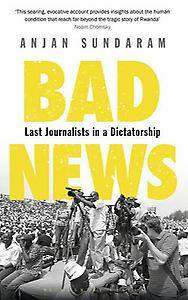
- Afhalen na 1 uur in een winkel met voorraad
- Gratis thuislevering in België vanaf € 30
- Ruim aanbod met 7 miljoen producten
- Afhalen na 1 uur in een winkel met voorraad
- Gratis thuislevering in België vanaf € 30
- Ruim aanbod met 7 miljoen producten
Zoeken
€ 20,45
+ 40 punten
Uitvoering
Omschrijving
Hearing a blast, journalist Anjan Sundaram headed uphill towards the sound. Grenade explosions are not entirely unusual in the city of Kigali; dissidents throw them in public areas to try and destabilise the government and, since moving to Rwanda, he had observed an increasing number of them.
What was unusual about this one, however, was that when Sundaram arrived, it was as though nothing had happened. Traffic circulated as normal, there was no debris on the streets and the policeman on duty denied any event whatsoever. This was evidence of a clean-up, a cloaking of the discontent in Rwanda and a desire to silence the media in a country most of whose citizens were without internet. This was the first of many ominous events.
Bad News is the extraordinary account of the battle for free speech in modern-day Rwanda. Following not only those journalists who stayed, despite fearing torture or even death from a ruthless government, but also those reporting from exile, it is the story of papers being shut down, of lies told to please foreign delegates, of the unshakeable loyalty that can be bred by terror, of history being retold, of constant surveillance, of corrupted elections and of great courage.
It tells the true narrative of Rwandan society today and, in the face of powerful forces, of the fight to make explosions heard.
What was unusual about this one, however, was that when Sundaram arrived, it was as though nothing had happened. Traffic circulated as normal, there was no debris on the streets and the policeman on duty denied any event whatsoever. This was evidence of a clean-up, a cloaking of the discontent in Rwanda and a desire to silence the media in a country most of whose citizens were without internet. This was the first of many ominous events.
Bad News is the extraordinary account of the battle for free speech in modern-day Rwanda. Following not only those journalists who stayed, despite fearing torture or even death from a ruthless government, but also those reporting from exile, it is the story of papers being shut down, of lies told to please foreign delegates, of the unshakeable loyalty that can be bred by terror, of history being retold, of constant surveillance, of corrupted elections and of great courage.
It tells the true narrative of Rwandan society today and, in the face of powerful forces, of the fight to make explosions heard.
Specificaties
Betrokkenen
- Auteur(s):
- Uitgeverij:
Inhoud
- Aantal bladzijden:
- 208
- Taal:
- Engels
Eigenschappen
- Productcode (EAN):
- 9781408866474
- Verschijningsdatum:
- 12/01/2017
- Uitvoering:
- Paperback
- Afmetingen:
- 129 mm x 200 mm
- Gewicht:
- 150 g

Alleen bij Standaard Boekhandel
+ 40 punten op je klantenkaart van Standaard Boekhandel
Beoordelingen
We publiceren alleen reviews die voldoen aan de voorwaarden voor reviews. Bekijk onze voorwaarden voor reviews.











